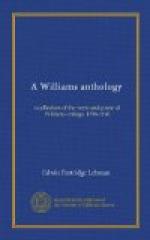* * * * *
“Dear Friends: This little book is composed of truthful pieces. All those which speak of being killed, died or drowned, are truthful songs; others are ‘more truth than poetry.’ They are all composed by the author.
“I was born in Plainfield, and lived there until I was ten years of age. Then my parents moved to Algoma, where they have lived until the present day, and I live near them, one mile west of Edgerton.
“JULIA A. MOORE.”
* * * * *
Among those pieces “which speak of being killed, died or drowned,”—and it was on these melancholy topics that she was at her best—are four poems which deal with the sad history of the House family. They seemed to have had the most abominable luck. When they couldn’t get shot or induce the small-pox to hasten their departure from this world of care, they passed away for no reason at all. Somehow they just could not keep alive. Martin House is the first of whom she speaks. He enlisted with a friend in the federal army at Grand Rapids. The final stanza of “The Two Brave Soldiers” discloses their fate—
“It was down in old Virginia
Those noble soldiers fell,
In the battle of Hanover town,
As many a one can tell.
They fought through many a battle
And obeyed their captain’s
call,
Till, alas, the bullets struck them
That caused them to fall.”
Hattie House had no reasonable excuse for dying, but she managed to fool her mother:
“Hattie had blue eyes and light
flaxen hair,
Her little heart was light
and gay,
And she said to her mother that morning
fair,
‘Mother, can I go out
and play?’
“Her mother tied her little bonnet
on,
Not thinking it would be the
last
She would ever see her dear little one
In this world, little Hattie
House.
“She left the house, this merry
little girl,
That bright and pleasant day—
She went out to play with two little girls
That were about her age.
“She was not gone but a little while
When they heard her playmates
call—
Her friends hastened there to save the
child,
But, alas, she was dead and
gone.




